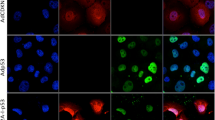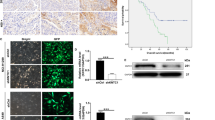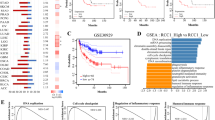Abstract
Increase of Skp-2, which is involved in the degradation of cell cycle regulators including p27Kip1, p21 and c-myc, is one of the important mechanisms for dysregulation of cell cycles in various cancers. We applied RNA interference (RNAi) for Skp-2 by using HIV-lentiviral or adenoviral vectors for a human small-cell lung carcinoma cell line with increased Skp-2 to evaluate RNAi strategy for cancer gene therapy. HIV-lentivirus-mediated RNAi for Skp-2 resulted in efficient inhibition of the in vitro cell growth of cancer cells with increased Skp-2 through the increase of p27Kip1 and p21, but no significant effect on the growth of cells without high Skp-2 expression. Furthermore, intratumoral administration of adenovirus siRNA vector for Skp-2 efficiently inhibited growth of established subcutaneous tumor on NOD/SCID mice. These results indicate that the Skp-2 RNAi may be a useful strategy for gene therapy of cancers with high Skp-2 expression.
This is a preview of subscription content, access via your institution
Access options
Subscribe to this journal
Receive 12 print issues and online access
$259.00 per year
only $21.58 per issue
Buy this article
- Purchase on Springer Link
- Instant access to full article PDF
Prices may be subject to local taxes which are calculated during checkout




Similar content being viewed by others
References
Toyoshima H, Hunter T . p27, a novel inhibitor of G1 cyclin–Cdk protein kinase activity, is related to p21. Cell 1994; 78: 67–74.
Masuda T et al. Clinical and biological significance of S-phase kinase-associated protein 2 (Skp2) gene expression in gastric carcinoma: modulation of malignant phenotype by Skp2 overexpression, possibly via p27 proteolysis. Cancer Res 2002; 62: 3819–3825.
Fero ML et al. The murine gene p27Kip1 is haplo-insufficient for tumor progression. Nature 1998; 396: 177–180.
Sutterlüty H et al. p45SKP2 promotes p27Kip1 degradation and induces S phase in quiescent cells. Nat Cell Biol 1999; 1: 207–214.
Yokoi S et al. A novel target gene, SKP2, within the 5p13 amplicon that is frequently detected in small cell lung cancers. Am J Pathol 2002; 161: 207–216.
Gstaiger M et al. Skp2 is oncogenic and overexpressed in human cancers. Proc Natl Acad Sci USA 2001; 98: 5043–5048.
Latres E et al. Role of the F-box protein Skp-2 in lymphomagenesis. Proc Natl Acad Sci USA 2001; 98: 2515–2520.
Yokoi S et al. Down-regulation of SKP2 induces apoptosis in lung-cancer cells. Cancer Sci 2003; 94: 344–349.
Kim SY et al. Skp2 regulates myc protein stability and activity. Mol Cell 2003; 11: 1177–1188.
Lehr N et al. The F-box protein Skp2 participates in c-myc proteosomal degradation and acts as a cofactor for c-myc-regulated transcription. Mol Cell 2003; 11: 1189–1200.
Zajac-Kaye M . Myc oncogene: a key component in cell cycle regulation and its implication for lung cancer. Lung Cancer 2001; 34: S43–S46.
Greenberg RA et al. Telomerase reverse transcriptase gene is a direct target of c-Myc but is not functionally equivalent in cellular transformation. Oncogene 1999; 18: 1219–1226.
Nakayama K et al. Targeted disruption of Skp2 results in accumulation of cyclin E and p27Kip1, polyploidy and centrosome overduplication. EMBO J 2000; 19: 2069–2081.
Bornstein G et al. Role of the SCFSkp2 ubiquitin ligase in the degradation of p21Cip1 in S phase. J Biol Chem 2003; 278: 25752–25757.
Miyagishi M et al. Optimization of an siRNA-expression system with an improved hairpin and its significant suppressive effects in mammalian cells. J Gene Med 2004; 6: 715–723.
Sumimoto H et al. Inhibition of growth and invasive ability of melanoma by inactivation of mutated BRAF with lentivirus-mediated RNA interference. Oncogene 2004; 23: 6031–6039.
Mizuguchi H, Hayakawa T . Adenovirus vectors containing chimeric type 5 and type 35 fiber proteins exhibit altered and expanded tropism and increase the size limit of foreign genes. Gene 2002; 285: 69–77.
Okada N et al. Efficient antigen gene transduction using Arg-Gly-Asp fiber-mutant adenovirus vectors can potentiate anti-tumor vaccine efficacy and maturation of murine dendritic cells. Cancer Res 2001; 61: 7913–7919.
Mizuguchi H, Kay MA . Efficient construction of a recombinant adenovirus vector by an improved in vitro ligation method. Hum Gene Ther 1998; 9: 2577–2583.
Acknowledgements
We thank Dr M Matsuoka for his helpful discussion and critical review of our manuscript. This work was supported in part by Grant-in-Aid for Scientific Research from the Ministry of Education, Culture, Sports, Science and Technology of Japan, a grant-in-aid for Cancer Research from the Ministry of Health, Labour and Welfare, Japan, for Second Term Comprehensive 10-year Strategy for Cancer Control, the Science Research Promotion Fund from the Promotion and Mutual Aid Cooperation for Private Schools for Japan, and the Keio Gijuku Academic Development Funds.
Author information
Authors and Affiliations
Rights and permissions
About this article
Cite this article
Sumimoto, H., Yamagata, S., Shimizu, A. et al. Gene therapy for human small-cell lung carcinoma by inactivation of Skp-2 with virally mediated RNA interference. Gene Ther 12, 95–100 (2005). https://doi.org/10.1038/sj.gt.3302391
Received:
Accepted:
Published:
Issue Date:
DOI: https://doi.org/10.1038/sj.gt.3302391
Keywords
This article is cited by
-
LncRNA LINC01116 sponges miR-93-5p to promote cell invasion and migration in small cell lung cancer
BMC Pulmonary Medicine (2021)
-
Silencing of FOXM1 transcription factor expression by adenovirus-mediated RNA interference inhibits human hepatocellular carcinoma growth
Cancer Gene Therapy (2014)
-
Inhibition of FOXM1 transcription factor suppresses cell proliferation and tumor growth of breast cancer
Cancer Gene Therapy (2013)
-
Suppression of myeloid cell leukemia-1 (Mcl-1) enhances chemotherapy-associated apoptosis in gastric cancer cells
Gastric Cancer (2013)
-
Expression of RNA interference triggers from an oncolytic herpes simplex virus results in specific silencing in tumour cells in vitro and tumours in vivo
BMC Cancer (2010)



